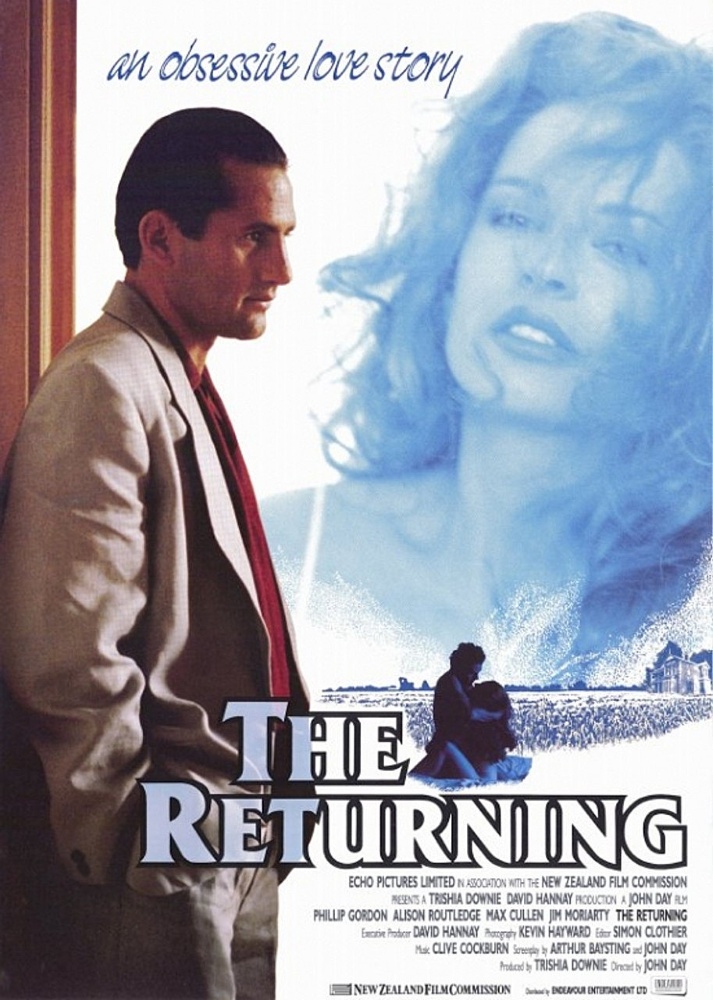Crew
Director – John Day, Screenplay – Arthur Baysting & John Day, Adaptation – John Day & Clinton Phillips, Story – Simon Willisson, Producer – Trish Downie, Photography – Kevin Hayward, Music – Clive Cockburn, Production Design – Michael Becroft. Production Company – Echo/New Zealand Film Commission.
Cast
Phillip Gordon (Alan Steadman), Alison Routledge (Jessica Scott), Max Cullen (Donohue), Jim Moriarty (George), Grant Tilly (Dr Pitts)
Plot
After the death of his grandfather, lawyer Alan Steadman inherits sole control of a $17 million trust in the will. The partners of the firm that Alan works for, headed by his father, want control of the trust. Walking out in anger at their obstruction, Alan drives out into the country, eventually coming to an old abandoned house. After staying the night, he becomes obsessed with the house and makes the decision to quit the firm and set up there. As he sleeps, a mystery woman appears and makes love to him. Researching the house’s history, he finds that the woman is Charlotte Heatherington, the daughter of a Scottish immigrant family, who lived there in the 1890s and died under mysterious circumstances. Alan’s girlfriend Jessica comes to visit and is disturbed to see him trying to drown himself in the lake to join Charlotte. His insistence on the real or imagined affair with Charlotte causes a rift in their relationship. Meanwhile, the partners at the firm seek to use Alan’s bizarre behaviour as an excuse to have him committed as mentally ill and gain control of the trust.
Doing an old-fashioned weepie ghost story in this day and age either takes a dedicated romanticism or a great foolhardiness to pull off. Sadly, this New Zealand-made effort, which never seems to have been seen by the wider world, has neither and emerges as a film of astounding silliness. In a country where all films were funded by a government body that was only backing around 5-6 productions a year, it seems astonishing that anybody saw either commercial potential or local cultural merit for a work like this.
The Returning seems like no more than a rehashed 1970s US ghost story tv movie. It sifts through all of the cliches of the genre and dissembles them into a stew of half ideas. The Charlotte character is so vaguely developed that one never gets any reason for Philip Gordon’s wanting to throw out the flesh and blood Alison Routledge for her. Nor does one understand why it is or even how Charlotte died. There are even more vaguely developed bits about Phillip Gordon’s fantasy playmates, suicide habits and the family’s heredity schizophrenia, which the film clumsily juggles to try and set up as existential red herrings.
Everything is deadeningly slow in pace, every exchange comes with a thudding emptiness that blows up it to the momentous. Business-suited heavies John Ewart and the ridiculously toupeed Grant Tilly are so unthreatening in their stock villainy and pseudo-menacing glimpses at one another, that the effect is contrarily funny. When Maori handyman Jim Moriarty starts rambling on about tree spirits and acid rain, one rubs their hands in anticipation that the film is at last getting loose on something interesting, only to discover that it takes these ideas with such a fatuous po-facedness it is hilarious. If the film actually had anything to say it might work; as it is all that we end up with is the actors echoing an embarrassed awareness of how daft the material they are playing is. It is only a competent artistic handling – the magnificent photography of the wide-open landscapes – that stops one from entirely slipping away to sleep.
Philip Gordon was always cast locally for his yobbo roles in other films of the era such as Came a Hot Friday (1985) and Bridge to Nowhere (1986). He has this likeable cockiness that comes somewhere between bolshie aggro and sly con-manship, but in a two-piece designer suit and trying to get into meaningful romantic emoting while cuddling an old wedding dress, he seems hopelessly lost. One wished at the least for a touch of the old Gordon to enliven the stultifying silliness of the piece. Alison Routledge, the lead from The Quiet Earth (1985), anguishes earnestly as the flesh and blood girlfriend. The casting of stalwart reliable Kiwi actor Max Cullen as a fallen Catholic priest living in a caravan in a deadbeat New Zealand town where pictures of Madonna and The Madonna are pinned to a wall is one characterisation that rings colourfully true.
Director John Day has never made another film
Trailer here


